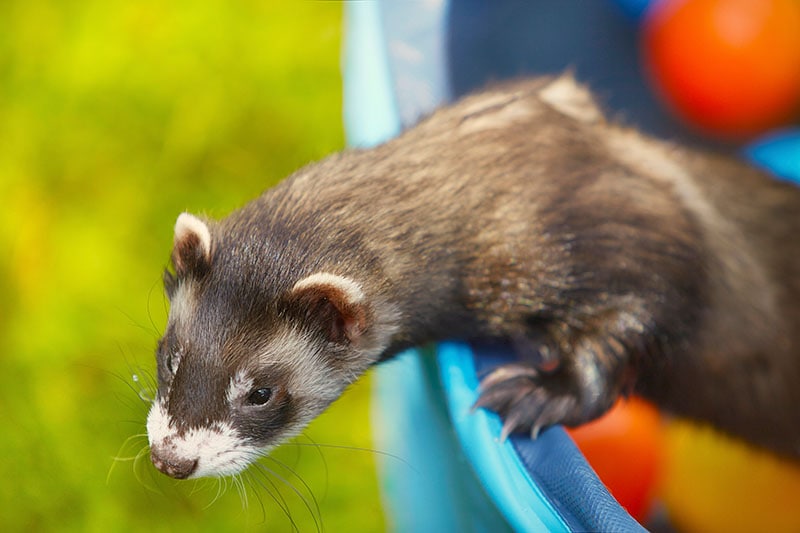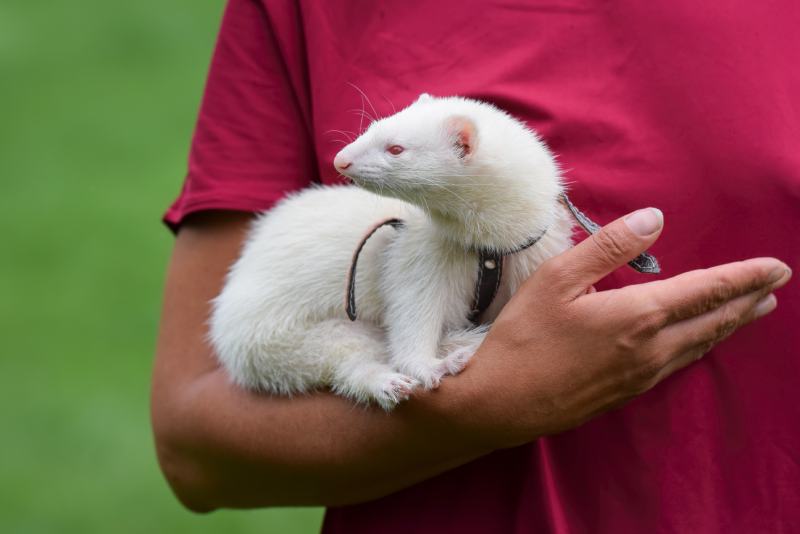Why Does My Ferret Bite My Feet? 6 Common Reasons & What to Do

Updated on

Click to Skip Ahead
There are many reasons that ferrets bite, and you probably know most of them already if you’re familiar with ferret behavior! You might still wonder why they always bite your feet, though, especially when you spend so much time holding or playing with them.
A ferret will bite your feet for several reasons. Most of the time, it’s a result of them wanting your attention. If you’re standing up or your feet are the only part of you that they can reach, they’ll resort to nipping at your toes or your ankles.
While it might seem like your ferret has it out for you, especially if those teeth come a little too sharp on your bare toes or you trip while trying to avoid stepping on them, just know that they’re not biting your feet because they dislike you. They’re simply too small to reach you properly.
Getting their owner’s attention might not be the only reason for a ferret’s feet-biting habit, though, so we explore more common reasons and how to stop the behavior in this guide.
Why Do Ferrets Bite Your Feet?
Like most animals, ferrets will bite for numerous reasons. Whether it’s a sharp, painful bite or a gentle nip, you can determine why your ferret is biting by paying attention to their body language and the situation that provoked the behavior. Here are common reasons that ferrets bite not just their owners’ feet, but anywhere they can reach.
1. Accident
Playtime is fun for everyone, but people sometimes get overexcited. Ferrets do too. They might be reaching for the ball that you’ve just picked up to toss for them or the treat that’s got their nose twitching. Those questing teeth can accidentally catch our fingers or toes.
These bites are complete accidents and don’t happen often, and when they do, it’s just part of playing with your ferret. If your ferret gets too excited, though, remember to take a step back and let them calm down before continuing to play.
2. Attention Seeking
Some ferrets will nip or bite because it’s how they’ve learned to get your attention. If they nip you enough times during playtime to realize that they always get rewarded with more of your attention, you might find them employing the habit when they’re feeling lonely too. After all, it’s quite difficult to ignore those sharp teeth, whether they’re gently digging into your toe or delivering a hard bite to your heel.

3. Curiosity
Like cats, dogs, and children, ferrets will explore the world around them with everything they have available. Their eyes, ears, nose, and paws all come into play, which of course, means their mouth does too.
Young ferrets are prone to this behavior the most, and they’ll frequently bite and chew things that they shouldn’t in their quest to investigate. While many ferrets grow out of this stage, this is when they learn whether biting is acceptable. In many cases, a young ferret will learn that nipping at your feet is a surefire way of starting a fun game with you.
4. Desire to Be Left Alone
Ferrets are naturally social animals. They love to be around people and other ferrets, but even they can get tired of being petted or bored with a game. When they just want to be left alone, they’ll be likely to request that you give them space by trying to squirm out of your hands or nipping your fingers. If their first request is ignored, they’ll become frustrated and often resort to a harder bite to make you leave them alone.
5. Playtime
While some bites are a sign that your ferret has had enough, gentle nips on your feet can be a sign that they want to play. These bites are usually gentle and will commonly be accompanied by playful behavior, such as jumping back and forth. If you stoop down to play, you’ll earn more playful antics and happy vocalizations from your delighted ferret.
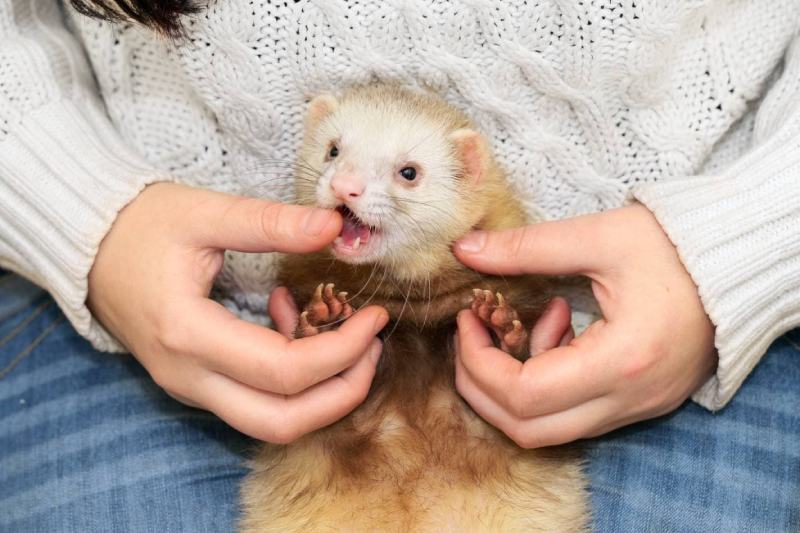
6. Fear or Pain
Ferrets might be fun pets, but they are still animals and have instincts just like any other animal does. These instincts show themselves the most when they’re in distress, whether it’s because they’re scared or in pain. In these cases, ferrets use every tool at their disposal to protect themselves, and their teeth are one of their lines of defense.
If you’ve recently adopted an adult ferret that bites, consider their history. They might have been abused or neglected. If they experienced a situation in the past where they needed to defend themselves and then experience a similar situation with you, they might bite first and ask questions later. You’ll need to build a trusting bond with your ferret and slowly work together to overcome their bad experiences and replace them with good ones.
You should also remember pain is a cause for biting too. If your ferret has a health issue or an injury due to rough play, they’ll need to be diagnosed by a veterinarian. Once you know what the issue is and treat it, the biting habit should go away on its own.
The Difference Between Friendly Nips and Real Bites
For a ferret, biting is a natural part of their playtime habits. Using their mouth when they jump on their ferret friends during playtime is just normal behavior for them. Unfortunately, our skin tends to be much thinner than a ferret’s. While a ferret might barely feel a brief nip that another uses to request playtime, the same force used on us can be more painful.
There are also two types of bites that ferrets will use to get their point across. Friendly and often gentle nips are used to request playtime, and sharp bites that make your feet sting are for times when your ferret has had enough. Both have different causes. Young ferrets will nibble and nip everything around them while they’re exploring things, including you. Sharp bites are more aggressive or fearful.
Both types of bites can be a problem if left uncorrected, especially when those otherwise gentle nips become less gentle in your ferret’s excitement. Always remember that an adult ferret nipping at you can cause more damage than a younger ferret nibbling on your hand.
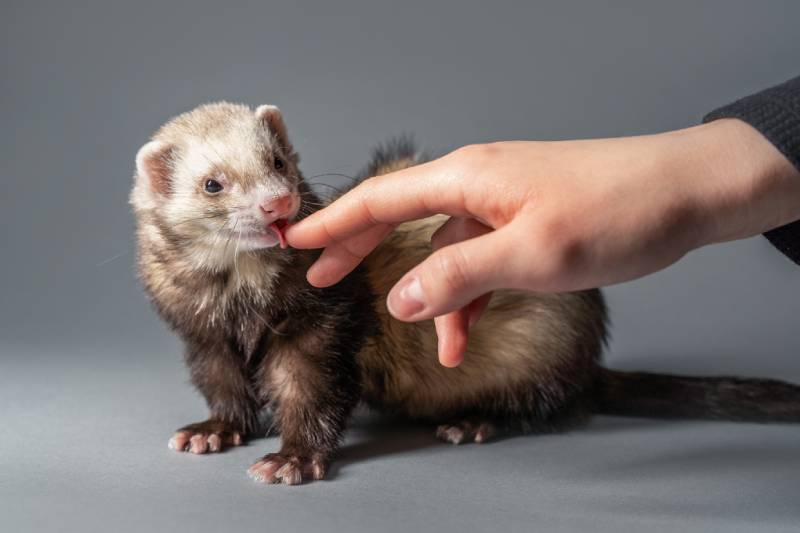
How to Prevent Biting
Your ferret nipping at your toes might be adorable, but it’s also not behavior that you want to encourage. While ferrets are generally affectionate and gentle, biting is one of those things that can quickly become a problem. This is especially true as your ferret grows up.
You’ll need to teach your young ferret that biting isn’t okay now to prevent accidents later. Fortunately, there are several ways that you can show your ferret that biting isn’t acceptable.
Reinforce Gentle Playtime
Ferrets love to play, and they’ll see your continued attention as a reward. Unfortunately, this means that if you continue playing after they bite you, they won’t learn that biting is wrong. Similarly, if you stoop down to play when they bite your feet, you’ll be teaching them that nipping is the correct way to ask for your attention.
Only play with your ferret if they’re being gentle. When they bite, say “no” firmly and walk away. Don’t try to hit them or yell, as this will hurt them and damage their trust in you. By stopping the game when they bite but continuing it when they play gently, you’ll be teaching them that being nice is the correct behavior.
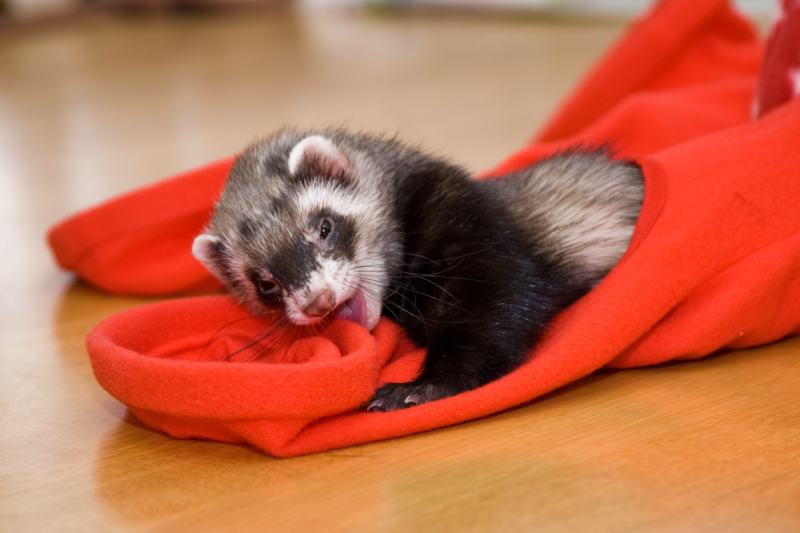
Be Consistent
Staying consistent with training isn’t an easy thing to do, especially when you’re tired. It’s important, though. You need to stop playing every time your ferret bites so they learn that it’s unacceptable. By telling them “no” sometimes and continuing to play every other time, you’ll just be confusing them, and their biting habit will likely become stress-related instead.
Conclusion
Biting is a natural behavior in ferrets, and many of their play habits involve frequent nips and head shakes. If they’re in a playful mood and want your attention, ferrets will nip you anywhere they can reach, which is often your feet.
While ferrets have tough skin, our skin is thinner, and a playful nip that was intended to be gentle can be painful, whether it lands on your hand or your foot. It’s best not to encourage biting, so use this guide to figure out why your ferret is biting your feet and learn how to prevent the behavior.
See Also:
- How Do Ferrets Show Affection? How to Tell They love You
- Why Does My Ferret Lick Me? 11 Possible Reasons
Featured Image Credit: everydoghasastory, Shutterstock


